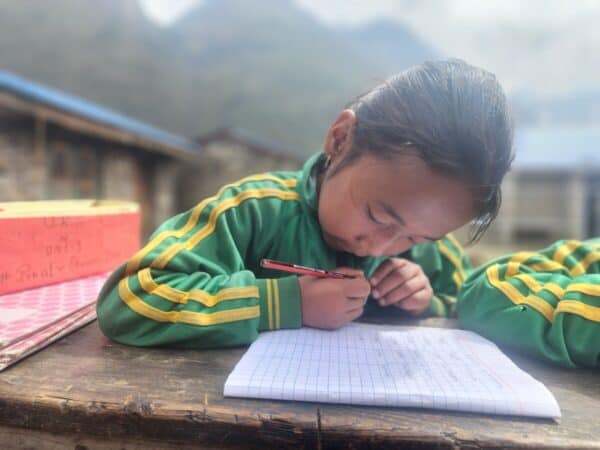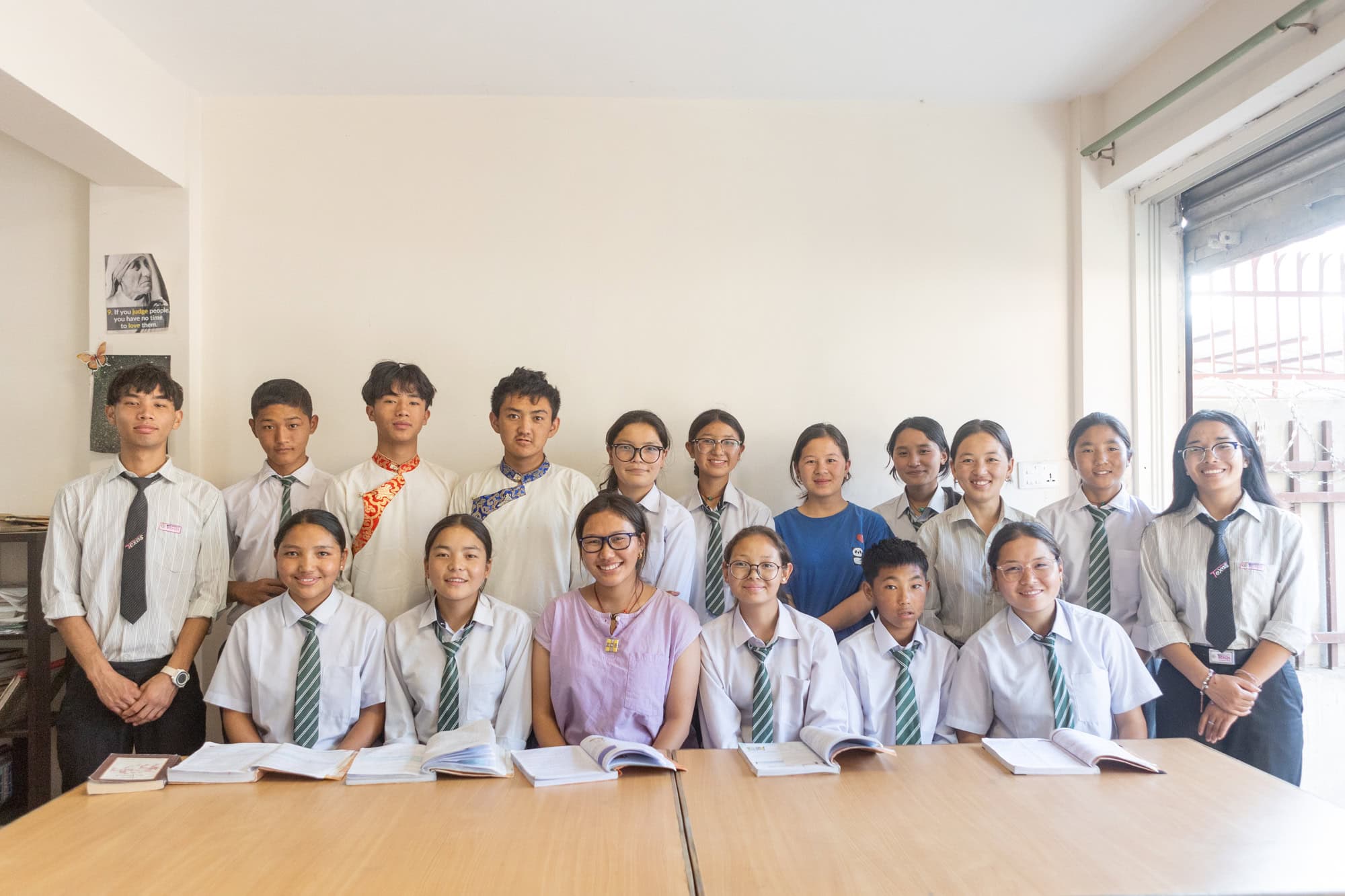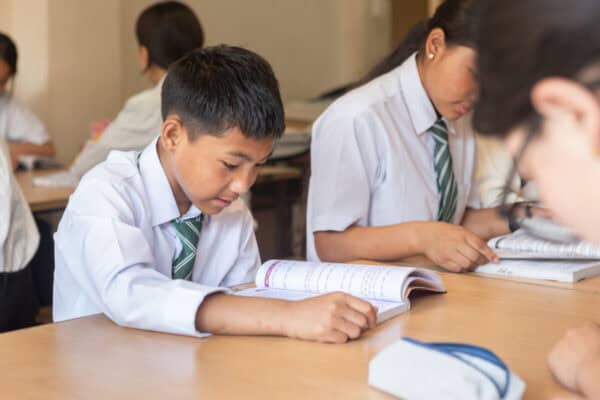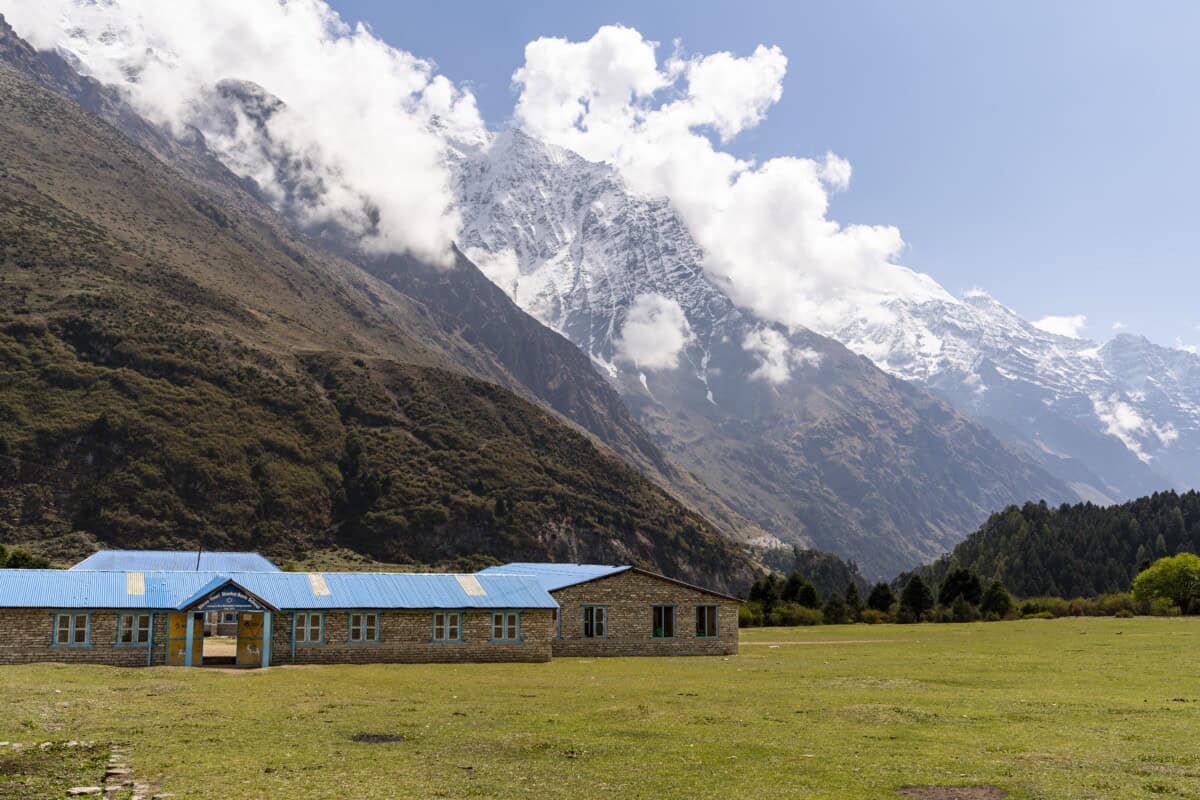Two Brothers, One Vision for Nubri
Nubri Valley, nestled deep in the Himalayas, is one of Nepal’s most remote regions and reachable only by a multiple day trek or by helicopter. Life here is shaped by extreme isolation, limited access to healthcare and education, and the growing impacts of climate change. As men and children leave in search of work and schooling, women are left to manage households, fields, and food security alone.
Born in Nubri, Tsoknyi Rinpoche and his brother Mingyur Rinpoche have dedicated themselves to preserving their homeland’s spiritual and cultural heritage—while creating pathways for children to access education. Through both monastic and secular education, they are nurturing a generation of grounded, capable leaders who can maintain roots to the Nubri culture.
Today, many of the nuns at Tsoknyi Gechak Ling and the monks at Tergar Ösel Ling, founded by Tsoknyi Rinpoche III and Mingyur Rinpoche, respectively, trace their roots to Nubri. Through both monastic and secular education, the brothers are nurturing a next generation of practitioners and leaders.
This webpage highlights the work of Tsoknyi Rinpoche and Pundarika Foundation; to learn more about Mingyur Rinpoche’s efforts, please visit tergarcharity.org
Tsoknyi Rinpoche’s
Himalayan Children Education Project
Raised in Nepal’s remote Nubri region, Tsoknyi Rinpoche understands the challenges faced by children growing up in mountain communities with limited access to education, healthcare, and opportunity. For decades, he has worked to uplift these communities—not only through the preservation of the Dharma, but by addressing urgent human needs with compassion and foresight.
His two main secular education initiatives bridge the gap between rural isolation and long-term opportunity:
- A primary school in Sama village and
- A continuing education project in Kathmandu that supports graduates of the school in Sama beyond grade 5.
These projects provide education, nourishment, and care—empowering young people to grow and thrive while remaining rooted in their cultural heritage.
According to UNESCO and the World Bank education contributes to:

Get Involved
Laying the Foundation for Lifelong Learning in Sama Village
Gauri Shankar Basic School – Educating the Next Generation in the Heart of the Himalayas
Located in the remote Himalayan village of Sama, in the shadow of Mount Manaslu—the world’s eighth-highest peak—Gauri Shankar Basic School provides access to quality, culturally relevant education from grade 1-5 for children in the Nubri Valley.
With the ongoing support of Tsoknyi Rinpoche, the school offers far more than academics. Students receive nutritious meals, safe boarding, and a curriculum that blends the Nepal national standard with Tibetan language, local culture, nature conservation, and vocational skills. The goal is to build both academic foundations and a deep connection to local heritage before students leave for further education in the cities.
“Education is the proper way to promote compassion and tolerance in society.”
— His Holiness the 14th Dalai Lama
A Local Solution to Early Migration
In many Himalayan communities, children are sent to faraway cities for schooling at a very young age. But studies show that this early educational migration can take a toll on their physical and emotional well-being. Gauri Shankar offers an alternative—allowing children to grow and learn in their own community while developing pride in their cultural identity and family livelihoods.
Currently, 57 students are enrolled in the primary school, with an additional 35 in kindergarten. The school’s leadership hopes to eventually expand through grade 10, empowering students with greater local opportunities and reducing dependence on distant, urban institutions.
Community-Led, Donor-Supported
Gauri Shankar is a model of local initiative and international partnership. It operates under the Tsoknyi Nuns Welfare Foundation, which manages all donated funds from Rinpoche and his students. These funds are distributed to private teachers as monthly salary payments and to local shopkeepers for food and school supplies.
Private teachers’ salaries and boarding food costs are two of the school’s most essential ongoing needs—both of which are not covered by the government. At present, there are two government teachers and four privately funded teachers, with a clear need for more skilled educators, especially in Tibetan language and vocational training.

The school also faces challenges due to harsh winter conditions. For nearly four months of the year, heavy snowfall makes it impossible to hold classes in the valley. Developing infrastructure and creative solutions for winter learning is a growing priority.
Long-Term Vision
Gauri Shankar’s long-term aim is to offer education through grade 10, with a curriculum that prepares students for both higher studies and meaningful work in their home region. The school also strives to foster parental involvement and cultivate students’ appreciation for Tibetan culture, mountain life, and local livelihoods—before they transition to urban life.
Supporting one student for one year—including education, food, and care—costs approximately USD $600.
By strengthening Gauri Shankar Basic School, we invest in a more compassionate and resilient future—one where children can learn, thrive, and carry forward the richness of Himalayan culture, right from the mountains they call home.
Supporting Himalayan Students Beyond Primary School
Opening Doors to Education in Kathmandu
For children growing up in the high Himalayan village of Sama, educational opportunities often end after Grade 5. With no local options for further schooling, students face the difficult prospect of leaving their families and communities behind to continue their studies.
In response to this challenge, Tsoknyi Rinpoche launched an educational initiative in 2017 to support these students through secondary school. As part of that ongoing effort, the Boudha Youth Hostel was established in 2022 to provide a safer, more nurturing environment than boarding schools typically offer—many of which lack proper nutrition, skill-building opportunities, and meaningful care. The hostel serves students who have no place to stay in Boudha during school holidays, giving them a true home away from home.

Students live together in a group hostel while attending reputable private schools in Kathmandu, receiving full scholarships and holistic care. The program began with just six students and has steadily grown. One recent graduate has returned to Samagaon to teach—offering a glimpse into the project’s long-term impact.
A Holistic Approach to Learning and Life
The hostel provides far more than just housing. Students receive mentorship, nutritious meals, academic guidance, emotional care, and a safe environment in which to grow. These resources foster not only academic success, but also confidence, independence, and long-term opportunity.
The team supporting the students is small but dedicated. Raissa Distefano, Project Head, manages the program locally in Nepal. Sonam Wangmo serves as the hostel manager, overseeing daily life. The team also includes one Didi (a Nepali term of respect for an older sister or trusted caregiver) who prepares meals and keeps the hostel clean. A few college students are also employed at the hostel, gaining income and experience while supporting operations.
Learn more about this project in this interview with Raissa DiStefano.
Rooted in Purpose, Growing with Intention
This project is deeply committed to supporting education, life skills, and professional development for students from remote Himalayan regions. The goal is to provide a strong foundation so students can grow into capable, compassionate adults—and, when possible, give back to their home communities in fields like education, health, and cultural preservation.

In support of this vision, a new eco workshop was recently launched at the hostel. The project began with the creation of zero-waste shampoo bars, giving college students a platform to explore entrepreneurship and sustainability. Though still in its early stages, the workshop reflects a growing emphasis on creativity, self-reliance, and real-world skill-building.
Help These Students Grow and Thrive
If you’d like to support these formative years as students grow into compassionate, capable young adults, please consider donating. Your support helps cover:
- Tuition and school supplies
- Food and rent
- Mentorship and emotional support
- Clothing and transportation
- Medical care (variable year to year)
- Skill-building and part-time employment

